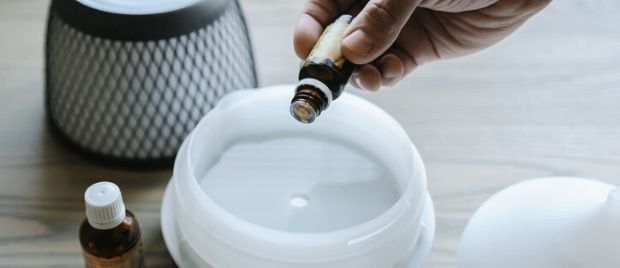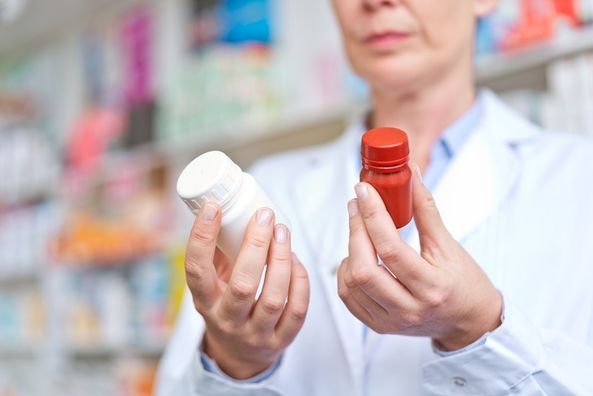Essential oils have become a popular way to relax and support your emotional well-being. While many are drawn to essential oils because they’re considered to be natural products, they’re not always risk-free. In fact, essential oils aren’t regulated by the Food and Drug Administration (FDA) and many of the associated health benefits have not been proven. Incorrect or over-use of essential oils can cause an allergic reaction, especially if you have asthma or are prone to environmental allergies. They can also pose health risks for pregnant women, children and pets. Here, allergist, Amee Majmundar, MD, shares tips on how to enjoy essential oils safely.
Essential oils can be administered by diffusing them into the air and inhaled or by applying them directly to the skin. Although some claim it is safe, they should not be ingested. Essential oils contain a variety of ingredients, and if you are sensitive to a particular ingredient, an allergic reaction can occur. Each allergic reaction can present differently, some may be mild while others may be more severe and even life-threatening. The severity of your reaction often depends on the potency of the oil and how it is used.
Reactions to essential oils
A reaction to an essential oil may manifest in a variety of ways, including:
Contact dermatitis
The most common allergic reaction to an essential oil is contact dermatitis — an itchy, red rash on your skin typically where the oil has been applied. In some cases, the rash may also blister or peel. The reaction may not always be immediate, you may not develop symptoms for several hours, or even days. Sometimes, contact dermatitis occurs if you are using oil that is too potent. Be sure to follow the directions to avoid overuse and try diluting in a carrier oil (oils extracted from plant nuts, seeds and kernels) if needed. If you dilute an essential oil and still experience allergy symptoms, discontinue use. Be sure to allow your skin time to heal before trying other essential oils.
If you’re sensitive to fragrances or environmental allergens, especially those that are plant-based like weeds and pollen, you’re at an increased risk of an allergic reaction to essential oils. If you plan to use your essential oils topically, we recommend performing a patch test first. The test can be done by applying a small amount of oil to your skin for a few days while monitoring for signs of an allergic reaction. This way you slowly introduce the oil to your body and limit the area of a potential reaction.
Nasal allergies and/or asthma symptoms
Essential oils are primarily made with plant-based ingredients and, just like other plant-based environment allergens, can cause nasal allergy or asthma symptoms. Nasal and asthma-related symptoms are more common when the oils are diffused and inhaled, causing:
- Asthma flare-ups
- Congestion and/or a runny nose
- Eye irritation
- Sneezing
Even if you don’t normally have allergies, you may develop nasal symptoms after using essential oils, especially those with a strong odor.
Photosensitive reactions
Some essential oils, including those containing citrus extracts (lemon, lime, orange or bergamot), are photosensitive. This means they can damage your skin when applied topically and the area is exposed to UV rays. If using a photosensitive essential oil, avoid sun or artificial UV ray exposure for at least 12 hours to prevent uncomfortable (and in some cases severe) symptoms including:
- Reddening of the skin
- Burning or itching
- Blistering
Common essential oils
There are many different varieties of essential oils available and your body may respond differently to each of them. It’s important to monitor your body’s response each time you try new oils. A few oils that are more likely to cause an allergic reaction include:
- Citrus-based oils (lemon, lime, orange or bergamot)
- Clove
- Jasmine
- Lavender
- Lemongrass
- Peppermint
- Tea Tree
- Sandalwood
- Ylang-ylang
Reducing the risk of an essential oil allergic reaction
You can reduce your risk of an allergic reaction by taking some precautions when using essential oils.
- If you have a nut allergy, read the ingredient labels thoroughly. Some carrier and essential oils, especially blends, may contain extracts such as argon, coconut, grapeseed or tree nut oils.
- Overuse can create an allergy. It’s important to follow the directions carefully and dilute oils before use, as needed.
- Keep essential oils in a cool place away from direct light. This prevents oxidation which breaks down the oil’s natural composition over time. If you notice the oil has changed color, or the smell is different, it’s time to toss the bottle!
- Avoid essential oil use in children, pregnant women and pets. Children’s skin is thinner and more sensitive to potential irritants than adults. Keep oils out of reach of children as they may be harmful if ingested or come in contact with eyes. It is recommended to avoid essential oils when pregnant as they penetrate your skin and can enter your blood stream. The effect of essential oils on a developing fetus is unknown, so to be safe, it is best to avoid them during this time.
If you suspect you’re allergic to an essential oil or begin experiencing an allergic reaction, stop use immediately. If diffused into the air, open windows and doors to allow fresh air in. If applied to your skin, wash the area well with a mild soap and water. You can also apply a cool compress or hydrocortisone cream for additional relief.
If symptoms persist or worsen, consult with your primary care physician. If you’re experiencing a more severe reaction, while rare, it requires immediate medical attention. Symptoms of anaphylaxis or a severe reaction often include difficulty breathing or swallowing as well as swelling in the throat or other areas of the body. Call 911 and/or go to your nearest emergency room right away if experiencing any of these symptoms.
When used properly, essential oils are considered to be safe and can enhance your everyday life. As with any substance that is inhaled or applied to your skin, it is important to use them as directed. If you experience any symptoms that may indicate an allergic reaction, discontinue use, and if needed, follow up with your physician.
If you experience sensitivity to environmental factors including fragrances or essential oils, an allergist can help you identify which allergens affect you and develop a custom treatment plan to minimize your exposure and manage symptoms. Learn more about our team of Allergy, Asthma & Immunology specialists or schedule an appointment online.
Health Topics:







